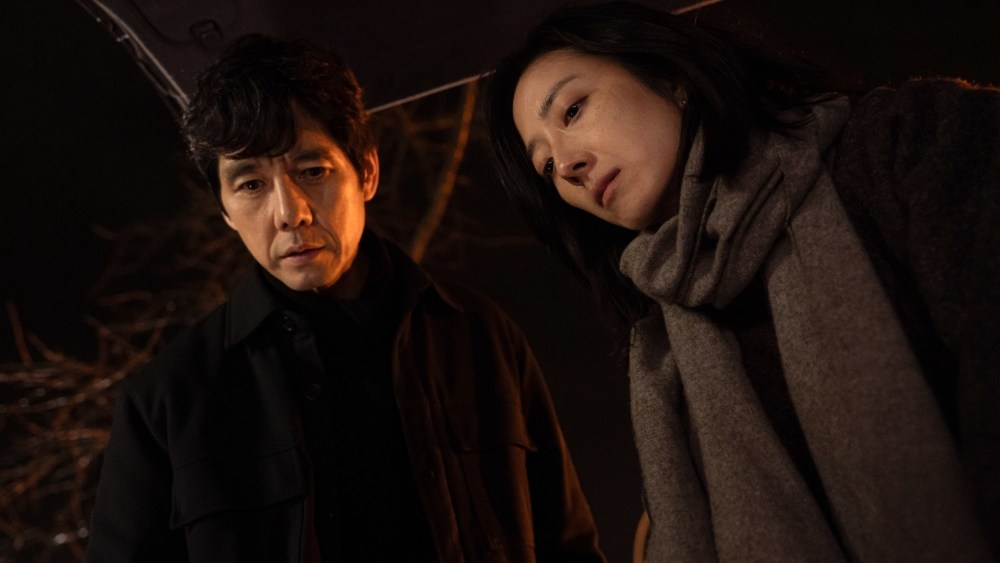Following the explosive violence of “Destruction Babies,” Japanese filmmaker Mariko Tetsuya has pivoted to explore a different kind of devastation in “Dear Stranger” — the quiet collapse of a marriage under the weight of unspoken truths and cultural displacement.
The drama, which had its international premiere at the Busan International Film Festival, stars Nishijima Hidetoshi (Oscar-winning “Drive My Car”) and Gwei Lun-Mei (“Black Coal, Thin Ice”). Set against the backdrop of New York, the film follows Kenji (Nishijima), a Japanese professor desperately seeking tenure, and Jane (Gwei), a Taiwanese-American puppeteer struggling to balance motherhood with her artistic identity. When their young son Kai goes missing, the couple’s carefully constructed life begins to unravel.
For Mariko, whose previous work “Destruction Babies” earned him the Golden Leopard for Best Emerging Director at Locarno, the shift to emotional rather than physical violence was sparked by his return to Japan during the pandemic. “The starting point was on the plane returning to Japan after a year living in the U.S., when a national state of emergency was declared,” Mariko explains. “The world suddenly changed and was engulfed in uncertainty, and I began to think about the family — the smallest unit of society.”
The director deliberately moved away from the “absurd violence” of his earlier work to focus on “the tragedy of drifting apart precisely because they care for each other.”
Central to the film’s visual and thematic language is the motif of ruins, both literal and metaphorical. Kenji lectures on the difference between Japanese static views of ruins versus Western dynamic interpretations and carries the memory of past earthquakes. “For Kenji, who studies ruins, the collapse of his own family into ruins marked both a beautiful and fleeting beginning,” Mariko notes. “I set this as the backbone of the screenplay and built the themes of the story around it.”
The ruins metaphor extends to Jane’s puppet performances in abandoned theaters, where larger-than-life puppets become extensions of her suppressed emotions. Working with Blair Thomas, Mariko developed choreography that allowed the puppetry to serve as Jane’s emotional outlet. “For Jane’s character, it was essential to show both her passion for puppetry and her conflict in balancing it with family life,” the director explains.
The film represents a true international co-production between Japan, Taiwan and the U.S., with filming in New York, editing in Taiwan, and a multinational cast and crew. For Mariko, the experience reinforced cinema’s power as a universal language. “I approached filmmaking with that ambiguity in mind,” he says regarding the challenges of multilingual communication. “Since the staff and cast came from different languages and cultures, our ongoing communication naturally became reflected in the film itself.”
Nishijima brings his characteristic intensity to Kenji, a man whose academic arrogance masks deep insecurity and desperation. “I wanted to portray Kenji as someone who is doing his best to live though imperfect — a character that reflects most of us,” the actor explains. Nishijima, who has built a career spanning Japanese and international productions from “Drive My Car” to Apple TV+’s “Sunny,” filmed in New York with a small, multinational cast and crew.
“Through this experience, I was reminded that film itself is a kind of universal language, and when everyone shares a strong passion to create something meaningful, it can take shape in ways that don’t rely on language,” he reflects.
Gwei Lun-Mei delivers an equally nuanced performance as Jane, a woman caught between her artistic ambitions and maternal responsibilities. The Taiwanese actor, who has worked across multiple film industries, found particular resonance in Jane’s struggle with cultural displacement. “Having studied abroad myself, I’ve felt that truly settling and being recognized by people from another culture is very difficult,” she says.
The puppet sequences became crucial for expressing Jane’s interior life. “The puppet scenes were extremely important for Jane. On one hand, they represented her passion; on the other, they were like another soul,” Gwei explains.
At its core, “Dear Stranger” interrogates the nature of love itself — particularly the gap between feeling and expression, intention and understanding. For Mariko, the question was sparked by photographer Masafumi Sanai’s assessment that he had “no affection, but having love” when they worked together on “From Miyamoto to You.”
“For me, love exists in cinema,” Mariko says. “It’s not an easily understandable emotion — it accumulates quietly and surely, through countless human connections. It arises so naturally from passion that it feels almost embarrassing to put into words, yet it’s also fragile, as if it might disappear if left unspoken.”

